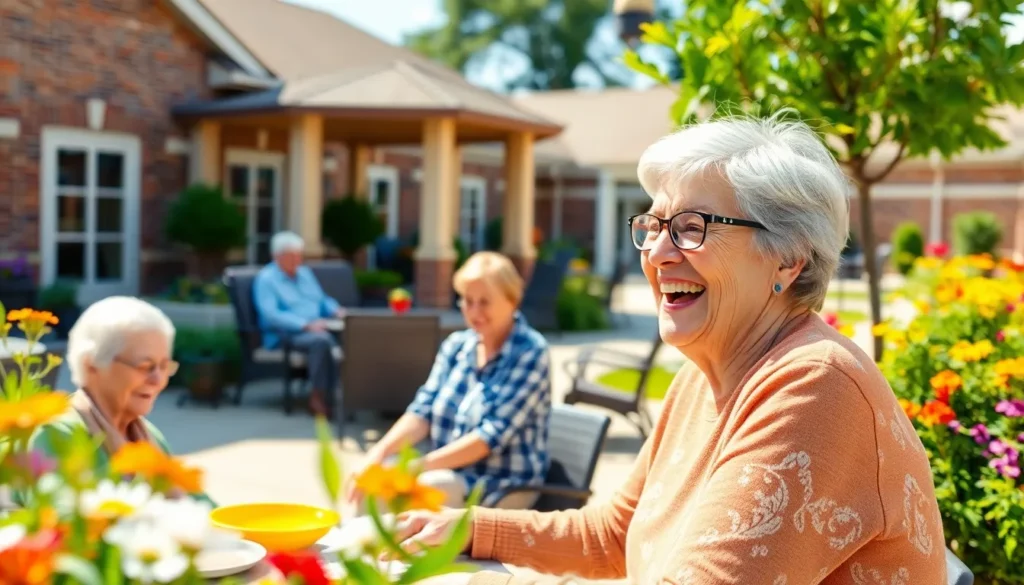Table of Contents
ToggleAs the population ages, finding suitable housing options for seniors becomes increasingly important. The right living arrangement can significantly impact an elder’s quality of life, providing not just shelter but also community and support. With various choices available, families often feel overwhelmed when navigating the best options for their loved ones.
From independent living communities to assisted living facilities and nursing homes, each option caters to different needs and preferences. Understanding these elder housing options helps families make informed decisions that enhance safety, comfort, and well-being. Exploring these choices can lead to a fulfilling lifestyle for seniors, ensuring they thrive in their golden years.
Understanding Elder Housing Options
Understanding elder housing options involves recognizing the various living arrangements available to seniors. Each option offers distinct levels of independence, support, and community engagement.
Independent Living Communities
Independent living communities cater to seniors who can manage daily tasks without assistance. These facilities provide an active lifestyle, featuring amenities such as fitness centers, social activities, and meal plans. Residents maintain their privacy while enjoying companionship.
Assisted Living Facilities
Assisted living facilities offer support for seniors who require help with daily activities, such as bathing, dressing, or medication management. These communities provide personalized care plans while promoting independence. Staff members are available around the clock, ensuring safety and accessibility.
Nursing Homes
Nursing homes, or skilled nursing facilities, provide extensive medical care and supervision for seniors with significant health needs. These facilities house trained medical professionals, including nurses and doctors, to deliver round-the-clock care. Services include rehabilitation, therapy, and specialized medical attention.
Continuing Care Retirement Communities (CCRCs)
Continuing care retirement communities (CCRCs) combine independent living, assisted living, and nursing home services on one campus. Seniors transition between levels of care as their health needs change, ensuring long-term support. CCRCs foster a sense of community and continuity for residents.
Memory Care Facilities
Memory care facilities specialize in providing care for seniors with Alzheimer’s disease or other forms of dementia. These facilities offer secure environments tailored to engage residents through structured activities. Staff members are trained to handle the unique challenges associated with memory loss.
Affordable Housing Options
Affordable housing options exist for low-income seniors requiring support. Programs like Section 202 offer subsidized housing, allowing seniors access to safe living conditions while remaining within budget. These options promote independence while offering accessible resources.
By exploring these various elder housing options, families gain insights into the best living arrangements for their loved ones, enhancing their quality of life and ensuring suitable support.
Types of Elder Housing Options

Understanding various elder housing options helps families choose the best arrangements for their loved ones. Each type addresses specific needs and preferences.
Independent Living
Independent living communities serve seniors who can perform daily tasks without assistance. Residents enjoy private apartments with access to shared amenities, such as dining areas, fitness centers, and recreational activities. Many communities offer social events to foster engagement and reduce isolation, promoting a vibrant lifestyle.
Assisted Living
Assisted living facilities support seniors requiring assistance with daily activities, such as bathing, dressing, and medication management. Staff provides personalized care tailored to individual needs in a residential setting, ensuring safety and comfort. These facilities often offer social and recreational programs that enhance life quality for residents.
Nursing Homes
Nursing homes provide extensive medical care for seniors with significant health needs. These facilities employ trained medical professionals who monitor residents and administer treatments. Nursing homes focus on rehabilitation services, skilled medical assistance, and 24-hour supervision, ensuring residents receive appropriate care in a safe environment.
Memory Care Facilities
Memory care facilities specialize in caring for seniors with dementia or other memory-related conditions. They offer secured environments to prevent wandering and promote safety. Structured activities stimulate cognitive function and provide social interaction, facilitating meaningful engagement for residents and supporting their well-being.
Factors to Consider When Choosing Elder Housing
Selecting the right elder housing involves careful consideration of several key factors that significantly influence an elder’s living experience. Understanding these elements ensures families make informed choices that align with their loved ones’ needs.
Location
Location plays a critical role in choosing elder housing. Proximity to family members provides emotional support and increases frequency of visits. Accessibility to essential services, such as healthcare facilities, grocery stores, and public transportation, enhances day-to-day convenience for seniors. Safety of the neighborhood is equally important; low crime rates and well-lit areas contribute to a secure environment. Exploring local community resources can also affect social participation and engagement levels.
Affordability
Affordability remains a vital consideration when evaluating elder housing. Families should assess monthly rental costs, service fees, and potential additional expenses. Understanding the financial implications enables better budgeting and planning. Various funding options, such as Medicaid, Supplemental Security Income (SSI), and veterans’ benefits can assist in managing costs. Comparing financial requirements between different housing types helps identify the best fit for a senior’s financial situation.
Services and Amenities
Services and amenities provided greatly influence quality of life in elder housing. Reviewing accessibility to health monitoring, assistance with daily activities, and on-site medical care ensures tailored support for residents with different health needs. Social activities, exercise programs, and communal spaces foster community engagement and reduce feelings of isolation. Evaluating dining options, transportation services, and maintenance support also impacts comfort and ease of living within the community. Prioritizing these factors allows families to select housing that enriches their loved ones’ daily experiences.
Benefits of Different Elder Housing Options
Elder housing options offer diverse benefits that significantly improve seniors’ quality of life. Understanding these advantages helps families choose the best living arrangements for their loved ones.
Social Interaction
Social interaction plays a vital role in maintaining mental and emotional well-being. Independent living communities and assisted living facilities foster social connections through organized activities, communal dining, and social clubs. Residents engage with peers, reducing feelings of loneliness and isolation. Memory care facilities also create opportunities for social engagement, offering structured programs that promote interaction among residents with similar cognitive challenges.
Safety and Health Care Access
Safety and health care access are crucial in elder housing options. Nursing homes and assisted living facilities provide 24-hour supervision by trained staff, ensuring immediate assistance during emergencies. These facilities also facilitate regular health monitoring and access to medical services, promoting proactive care management. Residents benefit from tailored support for chronic conditions or acute health issues, enhancing overall well-being.
Maintenance and Support
Maintenance and support services offered in elder housing options alleviate concerns about home upkeep. Independent living communities and assisted living facilities handle routine maintenance tasks, allowing seniors to focus on their daily activities and social lives. These options often include housekeeping, transportation services, and assistance with errands, providing peace of mind and a sense of independence.
Finding the right housing option for seniors is crucial for their overall well-being and quality of life. With a variety of choices available, families can select a living arrangement that aligns with their loved one’s needs and preferences. Whether it’s the independence offered by independent living communities or the comprehensive care found in nursing homes, each option provides unique benefits.
By considering factors like location, affordability, and available services, families can ensure their elders enjoy a safe and fulfilling lifestyle. Ultimately, the right housing choice can significantly enhance a senior’s happiness and health, fostering a supportive environment that encourages social connections and personal growth.



